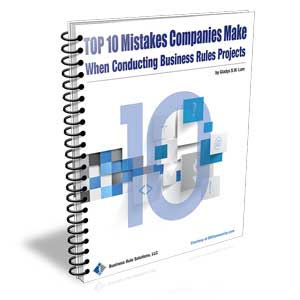Can a Definition be Violated? ~ Definitions and Business Rules
Suppose a company decides to define the concept it calls 'customer' as follows. No doubt other companies would define 'customer' differently!
- To include any person who has asked for a tender but not yet purchased anything.
- To exclude any person who has purchased from the company in the past, but who has not been in contact for the last five years.
Can the essence of these definitional ideas be violated?
Yes, of course. Although a definition is not literally a rule, it does place an obligation on workers in the business to talk and act accordingly. What if they fail to? Even though not necessarily recognized immediately, something they say or do or decide will be incorrect, which in turn is likely to cause something else in the business not to work or happen properly. In the worst case, something may break down completely.
Hopefully it will not come to that, and the mistake will be caught and corrected before it has a chance to do much harm. Nonetheless, someone is at least likely to be corrected -- if not blamed or sanctioned. To that person, it will certainly feel like a rule has been violated.
But exactly what was violated? A definition is a definition, and a rule is a rule, so what is the connection? Here formal logic offers a helping hand. Specifically, a definition (a good one anyway) always implies rules -- specifically, at least two logical implications, based on the "if and only if" of logical equivalence between the term and the definition. Consider the following example.
Woman: Person who is Female and Of-Age
The two logical implications (rules) arising from this definition are as follows:
Rule 1. A Person must be considered a Woman if that Person is Female and Of-Age.
Rule 2. A Person must be considered Female and Of-Age if that Person is a Woman.
Such rules come for 'free' -- that is, they can be inferred mechanistically (hopefully by an automated tool). They should not have to be expressed explicitly. They are obviously useful, for at least the following two reasons.
- To discover (mechanistically) anomalies or redundancies in relation to other
(perhaps far more complex) statements given by business people.
- To express fundamental rules that could be 'violated' in business communication, actions, or decisions, even if indirectly.
Now let's return to the company's original definitional ideas for their concept of 'customer.' The appropriate definition is expressed as follows.
Customer: person who has asked for a tender but not yet purchased anything
This definition results in the following two implicit logical implications (rules).
Rule 1. A person must be considered a customer if that person has asked for a tender.
Rule 2. A person must be considered to have asked for a tender if that person is a customer.
These rules are the natural implications arising from the definition. Workers in this business can be sanctioned for not acting accordingly. If workers refuse to call a person a customer if the person has only asked for a tender, and not purchased anything, they are clearly violating rule 1. Such violation can have significant repercussions. For example, suppose the company has the business rule: A customer must be granted access to the warehouse. If workers refuse to permit a tender-only customer into the warehouse, they are obviously violating the business rule. More fundamentally, what they are violating is the who-is-and-who-is-not-a-customer implication (rule) arising from the definition of customer.
Think of a definition as representing a decision that business people in authority make about proper patterns of behavior for the business. One person's definition becomes another person's rule!
By the way, you may have noticed there were parts of the original definitional specifications for 'customer' that did not show up in the rules. How should these be handled? They need to be separate clarifications, expressed explicitly.
Clarification 1. A customer does not always purchase anything.
Clarification 2. A customer is sometimes not in contact for five years.
Why not simply include these clarifications in the 'customer' definition itself? I will have more to say about that in a future column.
# # #
About our Contributor:
Online Interactive Training Series
In response to a great many requests, Business Rule Solutions now offers at-a-distance learning options. No travel, no backlogs, no hassles. Same great instructors, but with schedules, content and pricing designed to meet the special needs of busy professionals.










How to Define Business Terms in Plain English: A Primer
How to Use DecisionSpeak™ and Question Charts (Q-Charts™)
Decision Tables - A Primer: How to Use TableSpeak™
Tabulation of Lists in RuleSpeak®: A Primer - Using "The Following" Clause
Business Agility Manifesto
Business Rules Manifesto
Business Motivation Model
Decision Vocabulary
[Download]
[Download]
Semantics of Business Vocabulary and Business Rules